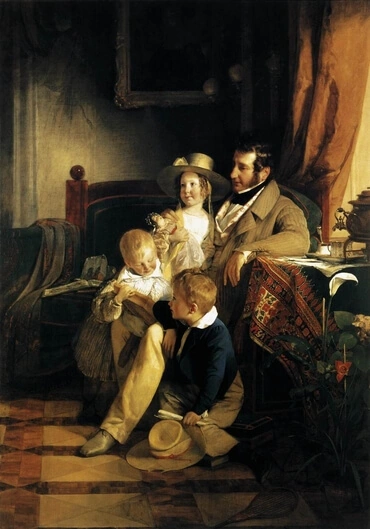1
OR queste sono le generazioni dei figliuoli di Noè: Sem, Cam e Iafet; e ad essi nacquero figliuoli dopo il diluvio.
2
I figliuoli di Iafet furono Gomer, e Magog, e Madai, e Iavan, e Tubal, e Mesec, e Tiras.
3
E i figliuoli di Gomer furono Aschenaz, e Rifat, e Togarma.
4
E i figliuoli di Iavan furono Elisa e Tarsis, Chittim e Dodanim.
5
Da costoro, per le lor famiglie, nelle lor nazioni, è venuto lo spartimento dell’Isole delle genti, nei loro paesi, secondo la lingua di ciascun di essi.
6
E i figliuoli di Cam furono Cus, Misraim, e Put, e Canaan.
7
E i figliuoli di Cus furono Seba, ed Havila, e Sabta, e Rama, e Sabteca; ed i figliuoli di Rama furono Seba e Dedan.
8
E Cus generò Nimrod. Esso cominciò ad esser possente sulla terra.
9
Egli fu un potente cacciatore nel cospetto del Signore; perciò si dice: Come Nimrod, potente cacciatore nel cospetto del Signore.
10
E il principio del suo regno fu Babilonia, ed Erec, ed Accad, e Calne, nel paese di Sinear.
11
Di quel paese uscì Assur, ed edificò Ninive, e la città di Rehobot, a Cala;
12
e, fra Ninive e Cala, Resen, la gran città.
13
E Misraim generò Ludim, ed Anamim, e Lehabim, e Naftuhim,
14
e Patrusim, e Casluhim onde sono usciti i Filistei, e Caftorim.
15
E Canaan generò Sidon suo primogenito, ed Het;
16
e il Gebuseo, e l’Amorreo, e il Ghirgaseo;
17
e l’Hivveo, e l’Archeo, e il Sineo;
18
e l’Arvadeo, e il Semareo, e l’Hamateo. E poi le famiglie de’ Cananei si sparsero.
19
Ed i confini de’ Cananei furono da Sidon, traendo verso Gherar, fino a Gaza; e traendo verso Sodoma, e Gomorra, ed Adma, e Seboim, fino a Lesa.
20
Questi sono i figliuoli di Cam, secondo le lor famiglie e lingue, ne’ lor paesi e nazioni.
21
A Sem ancora, padre di tutti i figliuoli di Eber, e fratel maggiore di Iafet, nacquero figliuoli.
22
I figliuoli di Sem furono Elam, ed Assur, ed Arfacsad, e Lud, ed Aram.
23
E i figliuoli di Aram furono Us, Hul, Gheter, e Mas.
24
Ed Arfacsad generò Sela, e Sela generò Eber.
25
E ad Eber nacquero due figliuoli, il nome dell’uno fu Peleg, perciocchè al suo tempo la terra fu divisa; e il nome dell’altro suo fratello fu Ioctan.
26
E Ioctan generò Almodad, e Selef, ed Asarmavet, e Iera;
27
e Hadoram, ed Huzal, e Dicla;
28
ed Obal, ed Abimael, e Seba;
29
ed Ofir, ed Havila, e Iobab. Tutti costoro furono figliuoli di Ioctan.
30
E le loro abitazioni furono da Mesa, traendo verso Sefar, fino al monte Orientale.
31
Costoro furono i figliuoli di Sem, secondo le lor famiglie e lingue, ne’ lor paesi, per le lor nazioni.
32
Queste son le famiglie de’ figliuoli di Noè secondo le loro generazioni, nelle lor nazioni; e da costoro sono discese le genti divise per la terra, dopo il diluvio.







